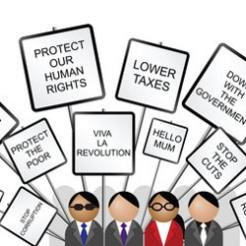A report released today by the National Council for Independent Action finds that charities hold back their campaigning activities over fears that they could face sanctions.
The report, Voluntary services and campaigning in austerity UK: Saying less and doing more, which was written by Mike Aiken, suggests that a “climate of fear and threats to free speech” is felt by the voluntary sector.
Aiken writes that civil society groups (CSGs) are confronted by “implicit, or explicit, pressures to ‘say less and do more’; they face gagging clauses in funding under contracting arrangements which threaten to stop them advocating and campaigning; and contracting for services may, step-by-step, co-opt them into complicity with the machinery of government”.
He also references the Lobbying Act and provisions in it that make it difficult to speak out.
Aiken said on the release of the report: “Charities have played an active role in a democratic society and this can be understood as their responsibility and ethical duty. Their voice needs to be heard and amplified, to provide a vital ingredient of evidence and to speak with authority and legitimacy to policy-makers and civil servants – enabling the voice and experience of the most disadvantaged to be heard in the corridors of power and by other citizens."
The report references examples of threats on charities' campaigning that took place last year, including MP Conor Burns reporting Oxfam to the Charity Commission for a tweet which he described as being “overtly political”, and the example of threats received by the chair of the Trussell Trust over its campaigning practices.
Aiken also conducted “semi-structured interviews with people in six key organisations, chosen to represent different types of organisational/group characteristics”. From these he concluded that “for some organisations speaking out in the current climate requires more than good evidence: it requires some bravery”.
The report concluded that voluntary organisations “face multiple challenges to their campaign roles”. It said that a number of other pressures were also arising for CSGs, including restrictions on what they could say if they have government contracts – due to confidentiality and gagging clauses.
It also references the impact of “self-censorship and fear” - where a “coercive atmosphere aided by government statements, legislations, and legal aspects of contracting processes” is leading to over-caution from voluntary organisations.
Penny Waterhouse, a director of NCIA, said: “This research shows that some voluntary groups can, and do, speak out for a better world – if they are brave and think of their beneficiaries instead of their organisational interests and professional status. But why, in Britain, does civil society need to be brave to exercise freedom of speech? It’s a bad, and dangerous, state of affairs. NCIA calls on voluntary services to exercise their civil liberties and join with activists and campaigners to advocate forcefully on behalf of their beneficiaries.”
The report is one of 17 reports published by NCIA as part of its Inquiry into the Future of Voluntary Services.
The Lobbying Act is having a 'chilling effect' on charity campaigning
A separate report due to be released next week will say that there is “clear evidence” that a number of charities have decided not to campaign in the run-up to the election because of the Lobbying Act.
Lord Harries, the chair of the Commission on Civil Society and Democratic Engagement, has told BBC’s World at One that its interim report on the impact of the Lobbying Act on civil society and democratic engagement before the regulated period will show that charity groups have been “frightened” into not campaigning for fear of breaking the law.
Lord Harries said: “We’ve had clear evidence that a number of campaigning groups have already decided not to campaign or not to join with other bodies to campaign on an issue because they are frightened of running foul of the Act or of overstepping the mark and this would be a reputational risk.”
He also said that charities and campaigning organisations had raised concerns that hostile politicians will make complaints against them to try to damage their finances or their reputations.
The Commission will be publishing the first evidence about the impact of the Lobbying Act on charities and campaign groups on Monday 26 January. It draws evidence from 50 charities, faith and campaign groups across the UK representing a wide range of issues. The Commission has previously produced two reports during the Lobbying Act’s progress through Parliament.
Sir Stephen Bubb, chief executive of Acevo, said: “The Lobbying Act was always a solution in search of a problem. This report shows it is diverting charities from their usual work for beneficiaries, plunging them into a sea of red tape.
“At Acevo we know how part two of the Lobbying Act works, and our advice is clear: keep calm and carry on campaigning. Charities should not be gagged, and they won’t be.
“We repeat the call we made in our general election manifesto for all political parties to commit to repeal the Lobbying Act in the first year of the new Parliament. The free speech of groups as well as individuals is too important to be curtailed by the political class.”









